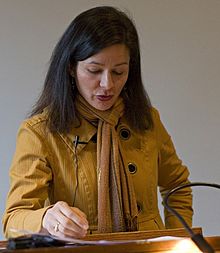Research areas
Lackey's primary research interests lie in social epistemology. [15] She is known for arguing against the traditional view of testimony,according to which testimony is a merely transmissive,rather than a generative,epistemic source. On this view,hearers can acquire knowledge on the basis of testimony only if the speakers themselves possess the knowledge in question and thus testimony transmits knowledge from one person to another without being able to generate knowledge in its own right. In Learning from Words:Testimony as a Source of Knowledge,Lackey uses her widely discussed creationist teacher case [16] [17] to argue that the standard view is false and that testimony can in fact be generative. In this case,a creationist teacher rejects all of the evidence supporting evolutionary theory and thus fails to either believe or know that modern day Homo sapiens evolved from Homo erectus,but nevertheless reliably conveys this fact about Homo sapiens to her students. This shows that the teacher imparts knowledge to her students that she fails to possess herself. Lackey then advances a theory of the epistemology of testimony that focuses on the linguistic or communicative items in testimonial exchanges,such as statements and other acts of communication,rather than the internal states of speakers,such as states of knowing and believing.
In other works,Lackey argues that reasonableness,rather than knowledge,is the norm of assertion, [18] that memory is a generative epistemic source, [19] [20] and that lying requires deception. [21]
Lackey is also known for arguing against the claim central to virtue epistemology that knowledge should be understood in terms of the knower's deserving credit for the truth of her belief. [22] Lackey argues that the virtue epistemologist faces a dilemma:either the standards for deserving credit for a true belief are relatively high,or they are relatively low. If they are relatively high,then the virtue epistemologist cannot account for instances of knowledge from testimony,where the credit for the hearer's true belief goes to the speaker. On the other hand,if the standards are relatively low,then the virtue epistemologist cannot distinguish between cases of genuine knowledge and Gettier cases where a person has a justified true belief by accident.
This page is based on this
Wikipedia article Text is available under the
CC BY-SA 4.0 license; additional terms may apply.
Images, videos and audio are available under their respective licenses.
